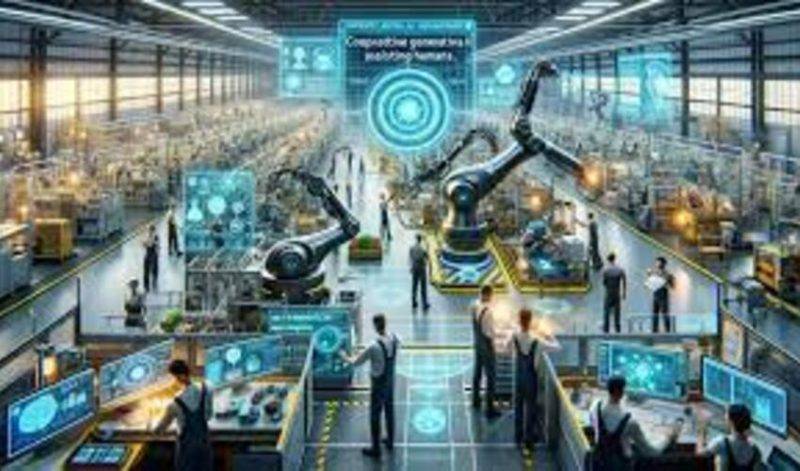AI has brought big changes to many sectors. It has hit manufacturing the hardest. AI manufacturing solutions are revolutionizing production. They make it more efficient and improve quality control. They are shaping the future factory. This article will explore how AI changes manufacturing. It will cover the involved technologies, their uses, and the future of AI in manufacturing.
Understanding AI Manufacturing Solutions
AI manufacturing solutions use a wide range of technologies. They use AI to improve and automate manufacturing. These solutions use machine learning, computer vision, robotics, and predictive analytics. They aim to optimize production, cut downtime, and improve product quality.
Critical Components of AI Manufacturing Solutions:
- Machine Learning: Algorithms analyze data to make predictions and decisions without explicit programming. This allows systems to improve over time based on historical data.
- Computer Vision enables machines to interpret and understand visual information. This ability is critical for quality control and defect detection.
- Robotics: AI-driven robots perform complex tasks with high precision, flexibility, and adaptability.
- Predictive Analytics uses data and math to find the likelihood of future outcomes. It does this by using historical data.
Enhancing Efficiency and Productivity
AI manufacturing solutions have many benefits. One of the main ones is a big boost in efficiency and productivity. AI systems can analyze huge amounts of data in real-time. They provide insights that help manufacturers optimize production.
For example, in a smart factory, AI-powered systems monitor machinery. They predict when maintenance is needed. It reduces unplanned downtime. It also extends equipment lifespan and ensures smooth production.
Quality Control and Defect Detection
Quality control is a critical aspect of manufacturing. Traditional methods often involve manual inspection. It can be slow and prone to human error. AI manufacturing solutions can automate and improve quality control processes. They are especially those involving computer vision.
Example: AI-powered computer vision systems can inspect products on the assembly line quickly. They can identify defects more accurately than humans. This ensures that only products meeting stringent quality standards reach the market.
Customization and Flexibility
The demand for customized products is rising. This requires manufacturers to be more flexible in their production. AI manufacturing solutions let factories adapt quickly to changes in product specifications. This happens without much downtime.
Example: AI-driven robotics can be reprogrammed and reconfigured quickly. They handle different tasks, letting manufacturers switch between product lines with little delay. This flexibility is crucial for meeting customer demands and staying competitive.
Supply Chain Optimization
AI manufacturing solutions extend beyond the factory floor to optimize supply chains. AI can predict demand. It provides robust inventory visibility solutions and streamlines logistics. It does this by analyzing data from many sources.
Example: AI algorithms can forecast demand. They do this based on past sales data, seasonal trends, and market conditions. This lets manufacturers adjust production schedules and inventory levels. It cuts excess stock and reduces stockouts.
Energy Efficiency and Sustainability
Sustainability is becoming a key focus for manufacturers. AI manufacturing solutions improve energy efficiency by optimizing energy consumption and reducing waste.
Example: AI systems can monitor energy usage across the factory. They can identify where energy is wasted. Manufacturers can cut their energy footprint. They can do this by optimizing machine operations and production schedules. This will also lower their costs.
Safety and Workforce Management
AI manufacturing solutions play a vital role. They improve workplace safety and workforce management. AI-powered systems can monitor working conditions and detect potential hazards in real-time.
For example, wearable devices have AI. They can monitor workers’ health and safety. They alert workers and management to risks such as fatigue or exposure to hazards. This proactive approach enhances worker safety and reduces the likelihood of accidents.
Real-World Applications of AI Manufacturing Solutions
Automotive Industry
The automotive industry has been at the forefront of adopting AI manufacturing solutions. AI-driven robots do assembly, welding, and painting. They ensure high precision and consistency. Predictive maintenance systems reduce downtime and keep production lines running smoothly.
Electronics Manufacturing
In electronics manufacturing, AI-powered systems inspect circuit boards and parts. They look for defects to ensure high quality and reliability. AI algorithms optimize production schedules. They use demand forecasts to do it. This reduces lead times and inventory costs.
Food and Beverage Industry
AI manufacturing solutions are used in the food and beverage industry. They find defects and contamination to improve quality control. AI systems also improve supply chain logistics. They ensure fresh products reach consumers on time.
The Future of AI Manufacturing Solutions
The future of AI manufacturing solutions is bright. AI technologies continue to advance. They are being integrated into manufacturing processes. Here are some prospects:
- The Internet of Things (IoT) will make AI manufacturing better. It will do this by giving more data. This data will come from connected devices and sensors. This will lead to even more precise predictions and optimizations.
- AI-powered robots will work better with humans. They will do repetitive tasks. This will let humans focus on complex and creative activities.
- AI algorithms are becoming more sophisticated. Their predictive abilities will improve. This will lead to more accurate demand forecasts, maintenance schedules, and production optimizations.
- More Autonomous Systems: AI systems will take over more manufacturing tasks. These range from material handling to complex assembly. They will further lessen the need for humans.
Conclusion
AI manufacturing solutions are changing manufacturing. They do this by making it more efficient, productive, and better at quality control. These solutions use advanced technologies. They include machine learning, computer vision, robotics, and predictive analytics. The tech optimizes production and cuts downtime. We look to the future. AI manufacturing solutions will keep shaping the factory of the future. They will fuel innovation, sustainability, and competitiveness in manufacturing.
Embracing AI manufacturing solutions lets manufacturers stay ahead of the curve. They can meet the demands of a market that is always changing. They can also set new standards for efficiency and quality. Adding AI to manufacturing is not just a tech advance. It is a strategic need for the future of manufacturing.
Zainab Afzal is a senior SEO Consultant and Writer. She has 5+ years of experience in Digital Marketing. After completing his degree in BS computer science, she has worked with different IT companies.





